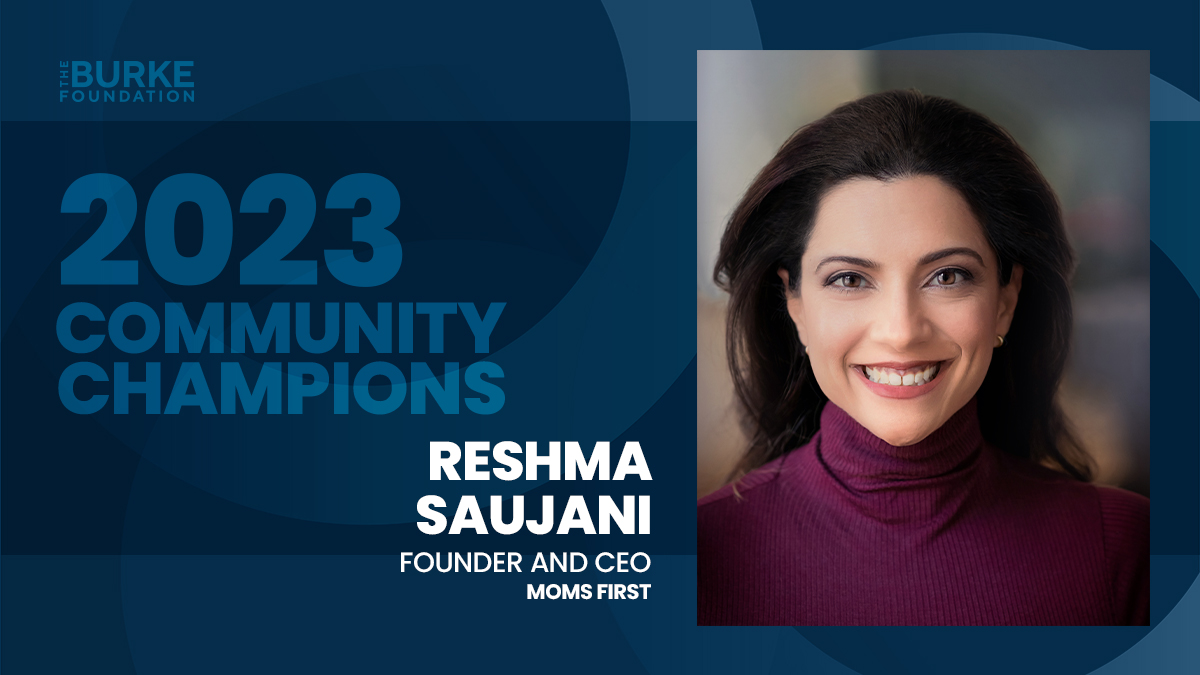“We’re taking on an issue that we have had to figure out on our own. And we’re asking for the type of support that we deserve.”
– Reshma Saujani, Founder & CEO, Moms First
Interview with 2023 Community Champion Reshma Saujani
Reshma Saujani was recognized by the Burke Foundation as a 2023 Community Champion for her career-long commitment to improving women’s lives. It started with her leadership of Girls Who Code, and has evolved in her role as founder and CEO of Moms First. She has inspired a movement to remove the stresses on families that go hand in hand with income inequality. She is a fierce advocate for increased access to quality child care and paid family leave for all – working with both companies and state and federal governmental leaders.

2023 Community Champion:
Reshma Saujani, Founder & CEO, Moms First
What accomplishment makes you most proud?
Personally, becoming a mother. I faced a lot of fertility challenges. I always wanted to be a mom from the time I was a little girl. So, I think never giving up on that dream is my biggest accomplishment.
My second-biggest accomplishment is Girls Who Code. I built one of the largest women and girls organizations in the world. We’ve taught over 600,000 girls to code. Half the girls we teach are from under the poverty line; are from underserved communities.
And lastly, launching Moms First. When I decided to step off of being CEO of Girls Who Code and to dedicate my life to passing paid leave and affordable childcare, people said, “What? What? Why are you doing that?” And I really realized that we will never be free as women unless we solve these two major structural issues. And there have been a lot of people who have tried.
And I believe in what we’re doing at Moms First — my team is incredible, brilliant, smart, we’re innovative. Just recently we launched the first draft of our generative AI tool on paid leave and child care. We’re thinking about this in different ways, and I do believe that in my lifetime, we will pass paid leave and child care.
At the Burke Foundation, we focus on supporting families during the first 1000 days from pregnancy through age two — what do you see as the biggest challenge for families during that time period? How do you address that challenge?
One is paid time off. Women lose almost $10,000 in wages because they have to take unpaid leave. So, the minute you have a child, because you don’t have those support structures, you’re pushing women and families into poverty and making them make unconscionable choices between funding their child care and feeding their children.
Are we giving parents, women, moms, the structural support that they need once they have a child? And that goes everywhere between paid leave, then to affordable childcare, then to pre-K education, all of the supports that we need in place to have families thrive.
What gives you hope in what you are seeing in the early childhood / maternal health space?
I think what gives me hope is that there’s a movement in process. We’re taking on an issue that’s been in the margins and bringing it into the mainstream. We’re taking on an issue that we have had to figure out on our own. And we’re asking for the type of support that we deserve. And you’re seeing a lot of change happening. Whether it’s more states passing paid leave, more conversations about maternal health, more leadership on maternal health and early childhood education, more states passing pre-K, more conversation around affordable childcare.
I still think we’re at the beginning of that movement. I still think that people don’t think of these issues at the same level as they think of AI and China, which I do. I think they’re equally important, right? They’re critical to our nation’s economic infrastructure. So we’re still in this kind of education phase, and we’re not immediately in persuasion, but it’s happening at least.
What is the secret to a great partnership — either with government, community or individuals?
I think everybody bringing their knowledge and information and their special sauce to the table. And we’ve had that experience with the Burke Foundation. The Burke Foundation was my very first funder. They wrote me almost my very first check. And part of that was sitting down with [Executive Director Atiya Ali] saying, “Hey, I have this idea.” And she was like, “Great, let me support you in helping you figure that out and helping you experiment.” What she was bringing to the table was that ability to give me the resources that I need to try. And what I was bringing to the table was this commitment to want to try and to do things and to want to do it in partnership. And I think that that’s the special sauce.
